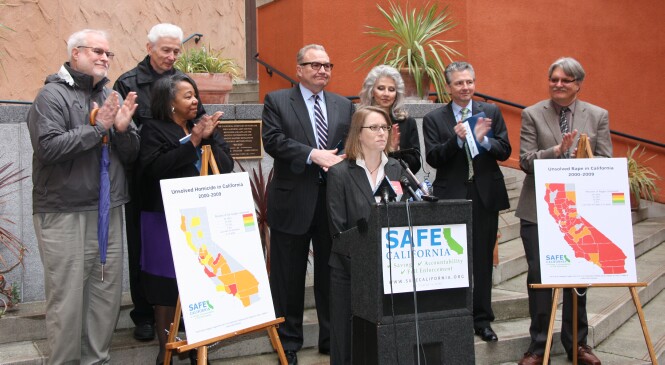 Yesterday in Sacramento County, a jury deliberating for less than a day found Richard Hirschfield guilty of the kidnapping and killing of two UC Davis students on December 20, 1980.
Yesterday in Sacramento County, a jury deliberating for less than a day found Richard Hirschfield guilty of the kidnapping and killing of two UC Davis students on December 20, 1980.
This case has had a lot of twists and turns. In 1993 the Yolo County DA at the time, David Henderson, dropped the charges against four people charged with the killings as a DNA test of a semen sample taken from a blanket in John Riggins’ van didn’t match any of the defendants.
After narrowly averting a wrongful conviction, perhaps, nine years later, the DNA hit traced to Mr. Hirschfield, who was imprisoned then in Washington for a rape.
He would be charged with murder in 2004, but not ordered to trial until March 2007 and, after continued delays, the case finally went to trial this year.
But there are more twists and turns on the way. For this case was tried as a death penalty case. They have gone through the guilt phase, including the expansive jury questioning and more.
However, whether this case ever goes to the penalty phase will be determined not by the judge, not by the attorney, but by the voters of the state of California.
If Proposition 34 passes tonight, Mr. Hirschfield, who is in his mid-60s, would be sentenced to life without parole.
If Proposition 34 is defeated tonight, Mr. Hirschfield would likely spend the rest of his life on death row waiting for an execution that likely will never come.
As we have argued from the start, the numbers suggest that nearly all of the more than 700 people currently on death row will die of natural causes or perhaps at their own hands, rather than be executed by the state of California.
Since 1978, just 13 people have been executed. None since 2006. And none will be executed any time soon.
According to The Legislative Analyst’s Office, a nonpartisan government agency, Proposition 34 will save the state $130 million every year.
A comprehensive five-year study by Federal Judge Arthur Alarcón (who is pro-death penalty) and Loyola Law Professor Paula Mitchell (who opposes the death penalty) showed the state has spent $4 billion on the death penalty since 1978. California has executed 13 inmates since 1978, at a cost of about $307 million per execution.
Judge Alarcón and Professor Mitchell updated that report this year to show that California is on track to spend $5 to $7 billion, over and above the cost of sentences of life in prison without parole, between now and 2050 unless we pass Proposition 34.
“I am the proud official proponent of the Savings, Accountability, and Full Enforcement Act of 2012 (SAFE California),” Jeanne Woodford said in a statement on Monday. “As former Secretary of the California Department of Corrections and Rehabilitation and former Warden of San Quentin State Prison, where I oversaw four executions, I know what works and what does not. I can tell you, without question, California’s death penalty is all cost and no benefit.”
As we reported last week, the latest Field Poll shows that Proposition 34 is leading in the polls.
“One major factor behind this surge in support is that many voters now understand that the death penalty is far more expensive than life in prison with no chance of parole,” Ms. Woodford added. “They realize that California has the largest and most expensive death row in the nation and has sunk billions of dollars into a broken system — while most death row inmates die of old age. Voters are ready to “stop dumping tax money down a rat hole.“
At the same time, California leads the nation in wrongful convictions at 123 according to the National Registry of Exonerations, and over 200 according to a report issued two weeks ago.
The Hirschfield case, had the DNA not exonerated the initial defendants, might have been one of them.
“So if any state could make another fatal mistake, it’s this one. Passing Proposition 34 will ensure that doesn’t happen,” Ms. Woodford argued.
Our analysis suggests that Proposition 34 just might pull off the win.
Conventional wisdom says that propositions that do not receive 50 percent are likely to fail, but there are several reasons Proposition 34 might buck those odds.
Pollsters Mark DiCamillo and Mervin Field last week noted that, while the measure has 45% support and 38% opposition, there is still a large 17% undecided. But most of that undecided has actually developed in the last month, suggesting that the undecided are moving away from the opposition and toward supporting the measure.
The pollsters note that a lot of what is driving this are fiscal considerations, and the proponents of the measure have noted that the death penalty is more expensive than alternatives.
The poll found that a growing number of respondents now agree with this notion.
“When asked about this in the current survey, 53% of likely voters now say the death penalty is more expensive than life in prison, while 31% think it is more expensive to house a convicted felon for life,” the pollsters write.
They note, “This represents a significant change in voter opinion compared to past Field Poll measures.”
“When voters hear our message and they hear the facts, they are much more likely to support the initiative,” said Natasha Minsker, campaign manager. “It really shows that the voters are learning the death penalty is all cost and no benefit.”
“It’s certainly an encouraging poll for the Proposition 34 supporters, but it still has a long way to go,” Field Poll Director Mark DiCamillo said. “It’s got to get above 50 percent, and it’s moving in the right direction.”
He noted that while many measures lose support as voters examine the issue more closely, this one “is actually gaining strength as voters learn more about it.”
What is driving this issue seems to be cost considerations.
“The single issue that resonates is cost,” said Don Heller who wrote the current law passed by the voters as an initiative in 1978. “Even when you address the issue of potentially executing an innocent person, it’s the cost that resonates. All of a sudden it’s being brought home, when counties are going bankrupt and cities are going bankrupt, that there’s just not enough money out there.”
However, the opponents of Proposition 34 disagree.
“This poll shows that Proposition 34 continues to be under 50 percent,” said Peter DeMarco, a spokesman for opponents of the measure. “It’s never been above 50 percent since the beginning of the campaign and I think the 17 percent undecided is significantly inaccurate for an issue that is of such familiarity in California.”
But is it? What seems to be happening is that a sizable portion of the opposition to Proposition 34 is moving and that accounts for the high undecided. The question is whether Proposition 34 supporters can finish their sales job by Tuesday to get to the majority.
—David M. Greenwald reporting





I voted yes on 34, because I don’t think it is working. However, there is some satisfaction in someone sentenced to die for abducting two young people, taking them to away from their families and friends, sexually assaulting, torturing and eventually killing them and dumping their bodies in a ditch, for no other reason than a brief period of pleasure from inflicting pain and suffering.
I’m glad the people of California saw through the grossly misleading prop 34. Since when has the ACLU been concerned with fiscal responsibility?
I’ve waffled a bit on this issue; mainly because of the possibility of accidentally executing an innocent man.
I’ve been reading the Davis Enterprise reports of the Hirschfield trial, and must admit that the horrible details of that crime helped sway my vote toward “no”.
I think the death penalty still has some symbolic value and some value as a deterrent. It may deter people who might otherwise risk getting caught; after all in prison they get free dental and medical care that many law-abiding citizens cannot afford; as an older criminal I suspect that prison old-age facilities are comparable to and maybe even better than some of the civilian low cost ones which many of the law-abiding can barely afford. With some of the horrific crimes committed by those convicted, I think living with a sword hanging over their head is an apt punishment.